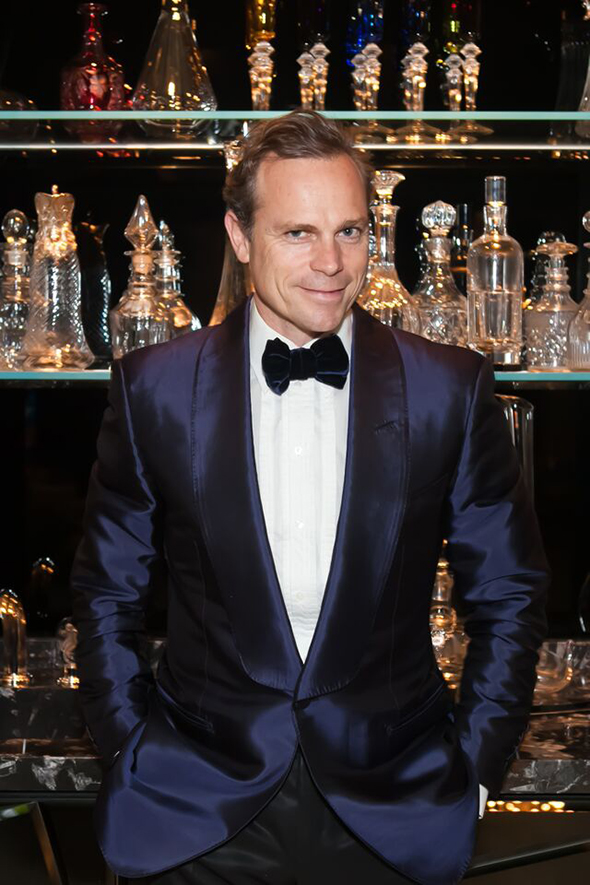The Audacity of Jean-Charles Boisset
 The stage is set. It’s opening night of Festival del Sole and Jean-Charles enters Castello di Amorosa like he owns it. He might as well, since he already has 25 wineries around the globe. Walking through the courtyard, drawing guests to him like a magnet, his presence surpasses the shine of the metallic tuxedo jacket he wears. There’s curiosity and mischief in his piercing blues eyes and his Cheshire Cat grin gives the impression he knows something that the rest of us don’t.
The stage is set. It’s opening night of Festival del Sole and Jean-Charles enters Castello di Amorosa like he owns it. He might as well, since he already has 25 wineries around the globe. Walking through the courtyard, drawing guests to him like a magnet, his presence surpasses the shine of the metallic tuxedo jacket he wears. There’s curiosity and mischief in his piercing blues eyes and his Cheshire Cat grin gives the impression he knows something that the rest of us don’t.
Originally from Vougeot, Burgundy, France, where his parents founded a winery in 1961, he arrived in the United States as a naïve eleven-year-old. “Before coming to America, I would fantasize that the American way of life was amazing and filled with possibilities.” Then, he landed on the ripe, fertile soil of Napa Valley and experienced a profound cultural shift that lead him on his path to his remarkable success. “Reality exceeded my expectations! Indeed, America allows you to dream, anything is possible here! So, I took advantage of the wonderful gift of freedom and exciting opportunities and I haven’t stopped yet.”
An alchemist of the senses, Jean-Charles can take the ordinary and transform it into a mind-blowing experience. To him, sound, taste, touch, smell, and sight are dancing muses he enjoys choreographing. A glass of wine is not just liquid; it is the intimate history of the grape vine, the sound of warm wind through its delicate leaves, and the taste of joyful moments when the elixir finally wets one’s palate. Every glass has a story and he is a master storyteller. “My ultimate objective is to enlighten, surprise, and to take people to a place where they thought they would never go.” He has the ability to harness ideas, experiences, and moments like they were wild horses at his beck and call.
A mercurial entrepreneur, he lives on the sharp edges of risk-taking. “I have never been bored. I am always curious to see where creativity will take me—usually beyond unlikely realms. I seek out extremes.” He continues to turn the conservative wine industry upside down with his innovations and radical changes. One such invention was the “smart bottle” used for his Yellow Jersey wine. Sure, the bottle is made out of plastic, but it’s unbreakable, reusable, recyclable, and lightweight. The success of the “smart bottle” was followed by his creation of the octagonal-shaped packaging with screw-top closures. His inspiration for that packaging was from an eggshell. “The eggshell is only 7% of the total weight of the egg—it is the most efficient packing of all time.” Once again, the unraveling of discovery that created a breakthrough in the wine industry.
Part of what drives Jean-Charles is his love of exploration. “I have always been interested in the eras between 1300 – 1600 AD, when we thought the world was flat—but we were wrong. This is a reminder that there is more space for imagination, exploration, being spontaneous, and dreaming.”
Jean-Charles shares.
As for his perception of reality, he does not see the world like the rest of us mortals. “I adore discovering other ways to see and experience. I am a big fan of Surrealism.” In some odd Surrealistic ideology, Jean-Charles challenges his thinking constantly. “It’s all about interpretation. The way I see a tree is not the same way that you see a tree. That fascination is constantly giving me other glimpses on how the world works.” Jean-Charles contemplates.
It is his continuous rumination that enticed him to design jewelry. “The jewelry is an experience of what I feel, see, and experience. First, the jewelry was born because I wanted to have an adornment on a bottle of wine that I could keep forever. Wine is a memory. Plus, men don’t have much for adornments. I won’t get a tattoo, so it is a great way to express who you are, and still be elegant. It represents what I want to wear—each piece has a deep meaning entrenched in what I strive to enjoy: all-encompassing nature, earth, the galaxy, precious metal, gemstones, pearls, and ideas of the mind.” He continues.
The interview concluded with a two-word question: “Any regrets?” He paused, and then answered in hushed tones, “Sometimes the regret I have is to do the obvious. I will
leave at that.”
text by Teresa Rodriguez

